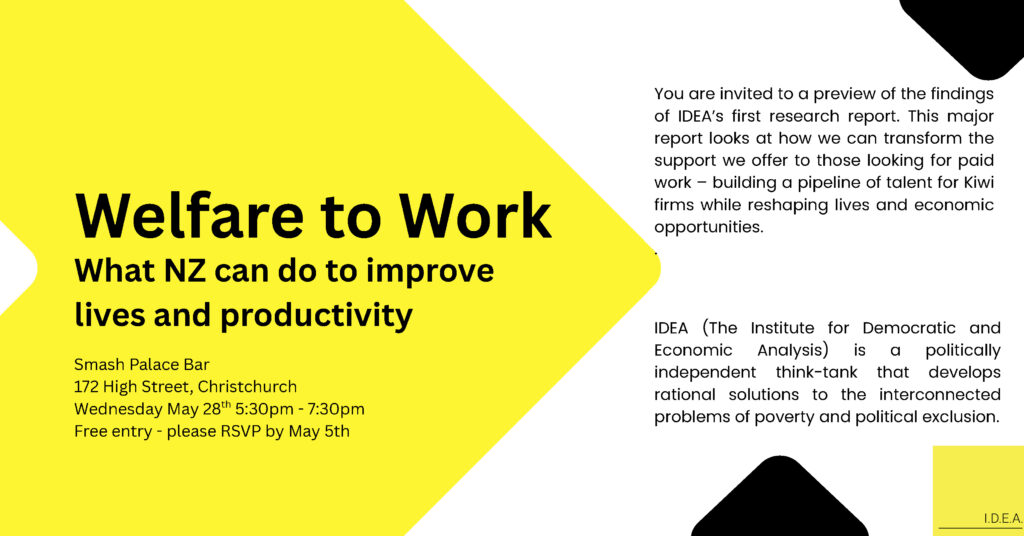
The Tuesday Club, in association with IDEA (the Institute for Democratic and Economic Analysis), invite you to a sneak preview of the findings of IDEA’s first research project. This major report looks at how we can transform the support we offer to those looking for paid work – building a pipeline of talent for Kiwi firms while reshaping lives and economic opportunities.
Max Rashbrooke has been researching global best practice on welfare-to-work policy, talking to policy-makers, and hearing from people delivering services on the ground. Supporting people’s aspirations for paid work is empowering, and it’s an immensely topical issue – but also an area in which New Zealand has long under-invested. Getting it right could be a key building block for a new, more dynamic economy.
IDEA is a new and politically independent think-tank that develops rational solutions to the interconnected problems of poverty and political exclusion. They seek to foster an open and robust public debate on these issues, and help politicians understand the solutions. Their vision is a flourishing society of widespread economic prosperity and democratic participation. You can learn more about them here.
The Research Project – Welfare to Work
IDEA’s research director, Max Rashbrooke, has been researching global best practice on welfare-to-work policy, talking to policy-makers, and hearing from people delivering services on the ground. Supporting people’s aspirations for paid work is empowering, and it’s an immensely topical issue – but also an area in which New Zealand has long under-invested. Getting it right could be a key building block for a new, more dynamic economy.
I heard you speak last week at Smash Palace’s Tuesday Club. Great to learn that I.D.E.A. is thinking about the long term serious impact of high unemployment and what to do about it.
Some of your suggestions had a familiar ring to them, taking me back to my own involvement in programmes in the 1980s in response to rapid rise in unemployment (6%) particularly hard hit were youth (31%) but mature experienced workers were also affected.
The government set up a tender process through the Department of Labour for offering relevant training schemes. The Continuing Education sector responded with a wide range of courses. At Christchurch Polytechnic these grew each year – the first I was involved in were in 1979.
I became HOD of a department called Special Programmes around 1982 and by the time I left in 1990 we were offering 33 courses ranging from computer to metal trades – attached a photo of those courses.
The polytechnic system was particularly well geared to offer such courses as we could offer a wrap around service of student health, gym membership, library services and child care.
We developed resources and training modules that we shared with other polytechnics including a group skills (produced a video). I was commissioned by UNESCO in 1986 to write a report and the ASTU Palmerston North Teachers College responded with providing papers on Transition Education Training – I wrote 3 of those.
For young people opening the door to a tertiary education was life-changing. They came, they felt welcomed and comfortable and could see themselves in the future returning to study, if they hadn’t been successful in getting a job following our (6-44 weeks) training courses. Student could do more than one course and change within courses if they did not suit if a space was available.
The polytechnic also had very close ties to industry training bodies – so everything in our courses were vetted by them as to the relevance of the material taught.
I thought I had only one copy of the UNESCO report (so I scanned it – 34 MB – so too large to send) but in fact have found a number of copies so happy to post one to you if you think it useful.
I have sent you some docs – As you mentioned – it is hard to find anything on line from that pre digital world.
All the best with your work and thanks for taking on the work to come up with ideas of how to address this serious issue.
Ngā mihi nui
Dr Cynthia Roberts